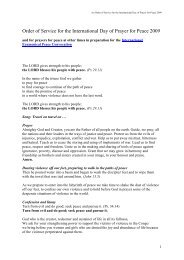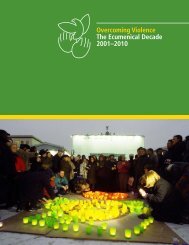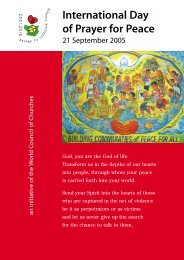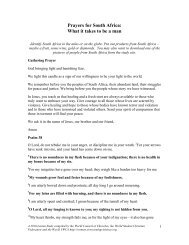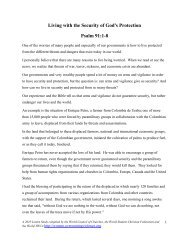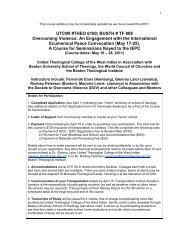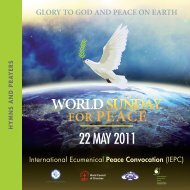Alternative Globalization Addressing Peoples and Earth
Alternative Globalization Addressing Peoples and Earth
Alternative Globalization Addressing Peoples and Earth
Create successful ePaper yourself
Turn your PDF publications into a flip-book with our unique Google optimized e-Paper software.
year. In addition, a new feature appears: the l<strong>and</strong> reverts to the families<br />
who had lost it because of poverty <strong>and</strong> debt. Jubilee fully restores the access<br />
by the poor to the resources of production <strong>and</strong> well-being. It goes far beyond<br />
distributive justice to restitution of people’s capacity <strong>and</strong> means to provide<br />
for life.<br />
The traditions of the Sabbath, Sabbath year <strong>and</strong> Jubilee year in the Torah<br />
confirm that God is a God of loving grace. To follow God is to enact this<br />
grace <strong>and</strong> justice for all in daily life <strong>and</strong> in the institutions that govern<br />
society. As God is the redeemer of all, loans, which place poor people in<br />
debt bondage, should be redeemed. The overriding concern is for the poor.<br />
The fallow year was instituted to provide food for the poor (Exodus 23:11):<br />
justice is the fruit of rest for the l<strong>and</strong> - an insight Indigenous <strong>Peoples</strong><br />
recognize. Impoverishment by wealth creation leads to the fragmentation<br />
of society. The first concern is for human need, not for private ownership,<br />
maximizing profits or following the “natural law’ of the market. The<br />
Sabbath <strong>and</strong> Jubilee institutions are about the restoration of the people in<br />
covenant with God. This is an intentional dismantling of institutions that<br />
enslave people through debt bondage.<br />
The Sabbath/Jubilee vision has played an important role in the struggle<br />
for justice. It has, for example, inspired the struggle against slavery <strong>and</strong><br />
revealed how such a powerful vision can change the world. The churches’<br />
prophetic mission regarding international financial issues also affirms that<br />
“Another World is Possible” where:<br />
• international financial systems are based on transparency,<br />
accountability <strong>and</strong> democratic control;<br />
• financial systems are at the service of the real economy - an economy<br />
of life in the service of people <strong>and</strong> ecological sustainability; <strong>and</strong><br />
• international responses to financial crises preserve the ability of affected<br />
countries <strong>and</strong> their populations to determine their own policies,<br />
priorities <strong>and</strong> long-term development strategies.<br />
4.4 Transformation of the global financial system<br />
Any international financial system should be designed to maximize progress<br />
towards justice, poverty eradication <strong>and</strong> environmental sustainability. To<br />
reach that end, diverse strategies are needed. It is imperative to promote<br />
debate concerning alternative systems of finance that are democratic in<br />
the full sense of the word. St<strong>and</strong>ard dem<strong>and</strong>s can still be made to the IMF<br />
<strong>and</strong> WB:<br />
• that voting structures must change, with an end to the US veto (or<br />
that of any country) <strong>and</strong> a stronger voice for developing countries;<br />
• decision-making must become transparent, <strong>and</strong> there must be a genuine<br />
31




